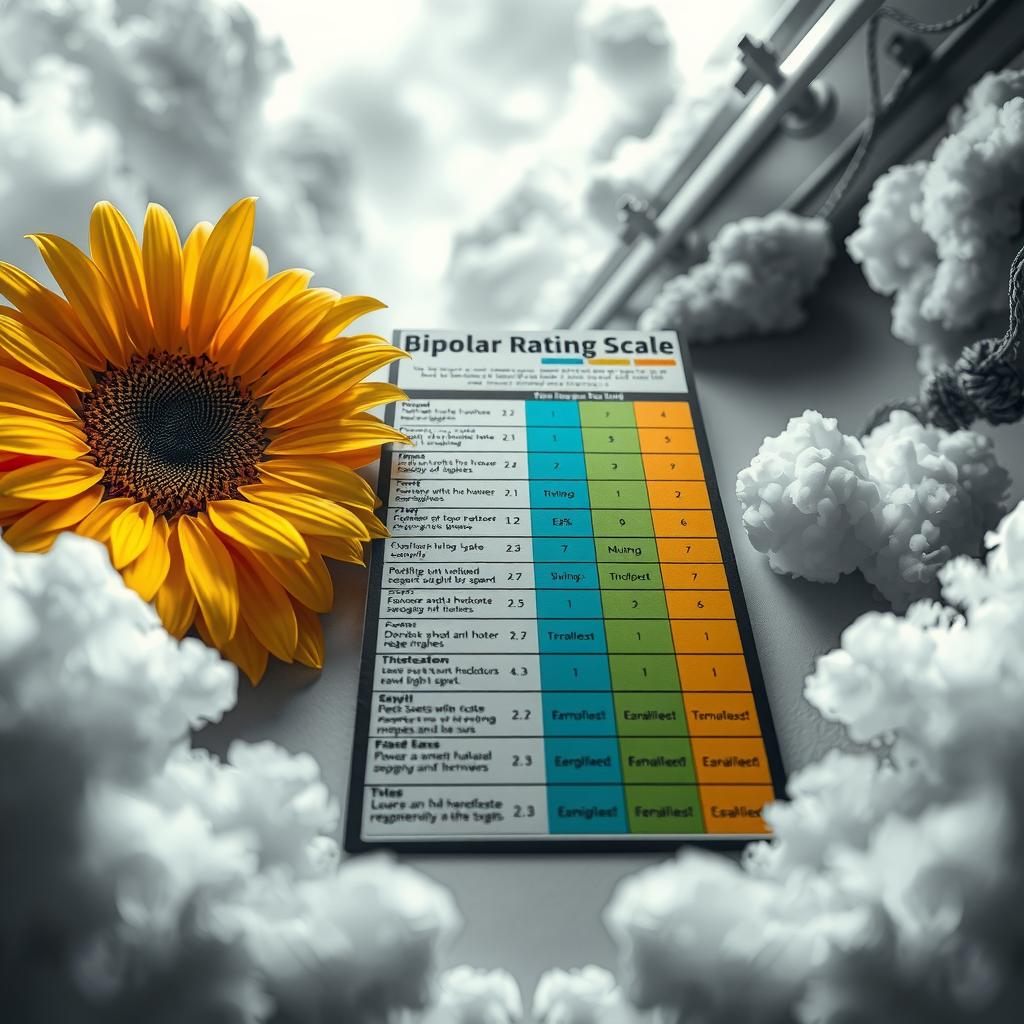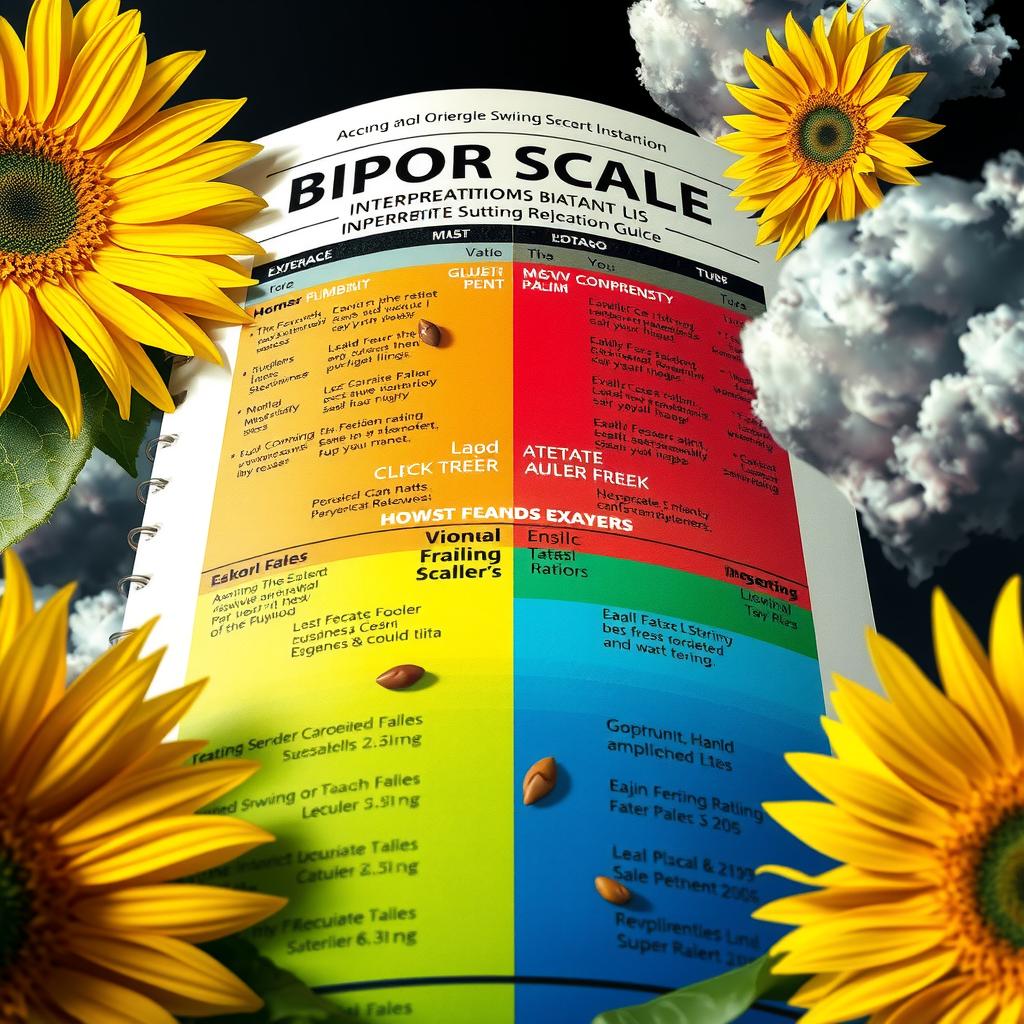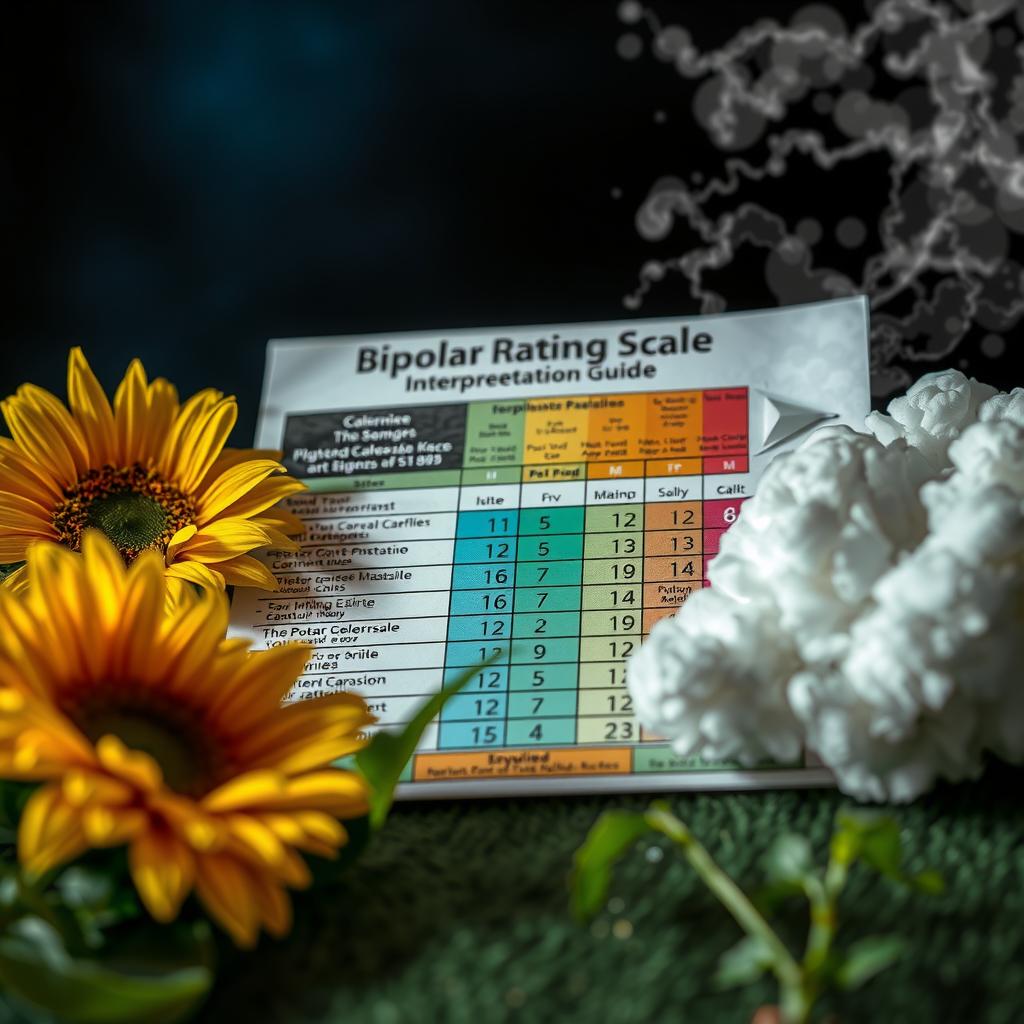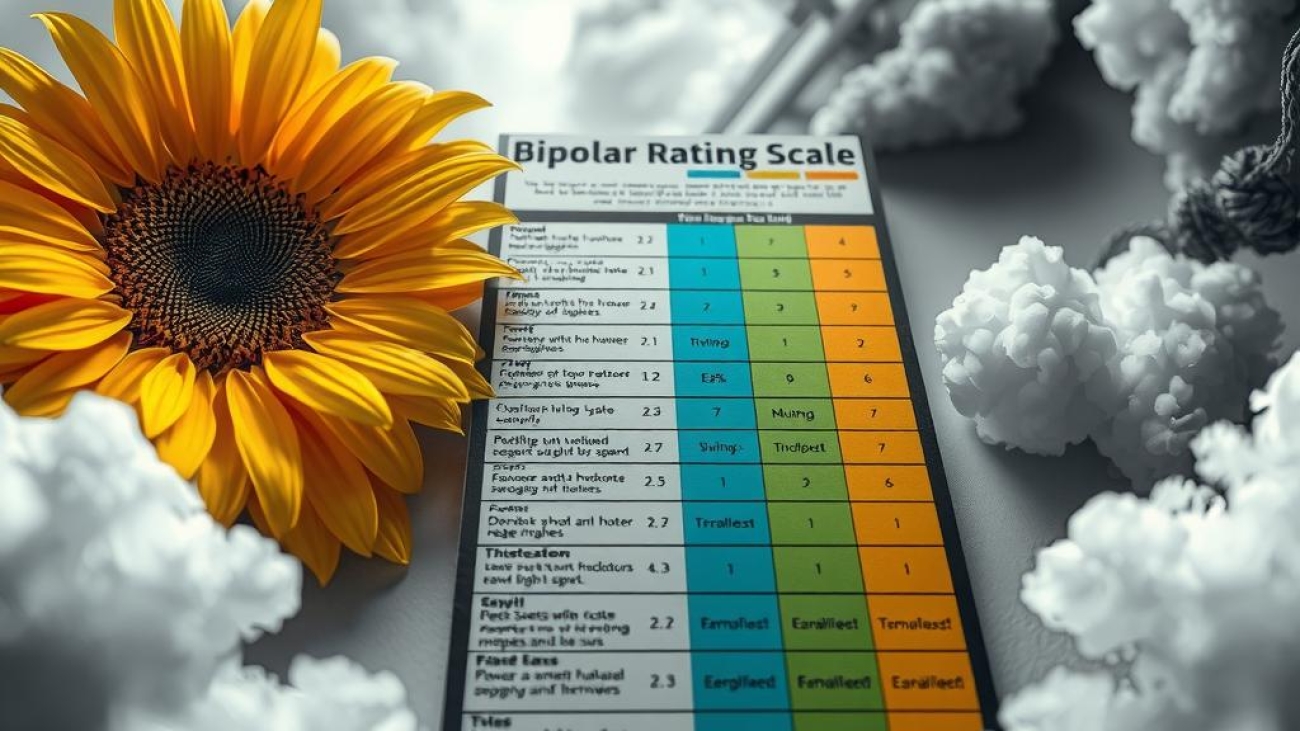In the realm of mental health assessment, understanding and identifying bipolar disorder remains a critical challenge for clinicians and caregivers alike. The complexity of this condition, characterized by extreme mood fluctuations that oscillate between manic highs and depressive lows, necessitates an effective evaluation method to ensure accurate diagnosis and treatment planning. This is where the YMRS bipolar rating scale comes into play—a vital tool designed to aid in the thorough assessment of manic symptoms associated with bipolar disorder. As mental health professionals strive for precision in their evaluations, familiarity with the YMRS interpretation becomes essential.
The significance of a reliable bipolar rating scale cannot be overstated; it serves as both a diagnostic instrument and an ongoing monitoring mechanism throughout treatment. With its structured approach to symptom measurement, the YMRS bipolar rating scale provides clear guidelines that allow clinicians to quantify severity levels effectively. This not only facilitates better communication among healthcare providers but also enhances patient engagement in their own care journey.
Moreover, navigating through clinical guidelines can often seem daunting for those new to psychological measurements or symptom assessment tools within psychiatric practice. However, mastering the nuances of the YMRS interpretation equips professionals with insights necessary for tailoring interventions specific to each individual’s needs. By utilizing this robust tool alongside qualitative assessments, practitioners can enrich their understanding of how bipolar disorder manifests in different patients—ultimately leading to more personalized therapeutic strategies.
As readers delve deeper into this guide on interpreting the YMRS bipolar rating scale, they will uncover practical tips and techniques designed not just for seasoned experts but also for emerging practitioners looking to deepen their knowledge base. Whether one seeks clarity on scoring criteria or wishes to enhance overall competency in conducting thorough evaluations—this article promises valuable insights that bridge theory with practical application in real-world settings.
Join us as we explore how leveraging this powerful tool can transform approaches toward bipolar disorder evaluation while fostering improved outcomes for individuals navigating these challenging experiences.

Key Points: Vital Insights into the YMRS Bipolar Rating Scale and Its Interpretation
In the field of mental health, understanding how to effectively utilize the YMRS bipolar rating scale is critical for clinicians engaged in bipolar disorder evaluation. This scale not only facilitates a systematic approach to assessing mood symptoms linked with mania but also serves as an invaluable resource in clinical practice. By familiarizing themselves with scoring criteria and item specifics, healthcare professionals can enhance their interpretation skills, leading to more accurate diagnoses.
The first aspect worth noting is that the YMRS bipolar rating scale provides distinct scoring items that focus on various symptoms of mania. Each item evaluates specific behaviors or feelings over a set timeframe, offering a nuanced view of the patient’s condition. Understanding these individual components allows clinicians to measure symptom severity accurately and track changes over time—a crucial element in effective treatment planning.
Secondly, reliable psychological measurements are fundamental for creating tailored patient care strategies. The data obtained from the YMRS bipolar rating scale can significantly inform discussions about treatment progress between practitioners and patients. Regular assessment using this tool ensures that adjustments can be made promptly based on real-time insights into symptom fluctuation. This responsiveness contributes to better management outcomes for individuals living with bipolar disorder.
Lastly, interpreting scores derived from the YMRS requires familiarity with both clinical guidelines and practical applications within real-world settings. Clinicians must not only grasp theoretical concepts surrounding bipolar disorder but also apply this knowledge practically during assessments. Engaging deeply with each aspect of the YMRS interpretation, including its strengths and limitations, empowers professionals to make informed decisions—ultimately enhancing overall patient wellbeing through targeted interventions.
By embracing these key elements related to the YMRS bipolar rating scale, healthcare providers position themselves as informed advocates for their patients’ mental health journeys—bridging gaps between assessment tools and effective management strategies in navigating complex mental health landscapes.

Understanding the Structure of the YMRS
An Insight into the Key Components
The YMRS bipolar rating scale, or Young Mania Rating Scale, is a pivotal tool in mental health assessment, particularly for evaluating manic episodes in individuals with bipolar disorder. This structured clinical interview consists of 11 items that assess various symptoms associated with mania, such as elevated mood, irritability, and increased energy levels. Each item on the scale is rated from 0 to 4, with specific definitions provided for each score to ensure consistency and accuracy in responses. The scoring system facilitates a detailed understanding of symptom severity and aids clinicians in making informed decisions regarding diagnosis and treatment plans. By quantifying the intensity of manic symptoms, practitioners can effectively monitor changes over time and tailor therapeutic interventions accordingly.
A unique aspect of the YMRS bipolar rating scale is its emphasis on both observable behaviors and subjective experiences reported by patients. This dual approach not only enriches clinical evaluation but also enhances patient engagement during assessments. For instance, clinicians may inquire about sleep patterns or goal-directed activities while simultaneously allowing patients to express their feelings about their current state—an essential facet when interpreting results relevant to bipolar disorder evaluation. Furthermore, adherence to standardized clinical guidelines ensures that this psychological measurement remains reliable across different settings and populations.
The Importance of Accurate Interpretation
Decoding Results from the YMRS
Interpreting results from the YMRS bipolar rating scale requires careful consideration of multiple factors that influence an individual’s presentation during assessments. Each score derived from this symptom assessment tool provides insight into potential areas requiring intervention; thus, higher total scores indicate more severe manic symptoms which may necessitate immediate attention or modification in treatment strategies. Clinicians should be mindful that variations might exist based on cultural contexts or individual coping mechanisms when applying these findings within broader mental health assessment frameworks.
Moreover, it is vital for healthcare providers to integrate insights gathered through the YMRS interpretation into comprehensive care plans tailored specifically toward enhancing patient well-being while managing their condition effectively. Continuous monitoring using this scale allows for timely adjustments in medication regimens or therapeutic approaches as needed—demonstrating its value not just as a diagnostic instrument but also as an ongoing guide throughout treatment journeys involving those diagnosed with bipolar disorder.
In summary, utilizing tools like the YMRS bipolar rating scale within psychiatric practice fosters improved communication between clinicians and patients alike by providing a clear structure around symptomatology related to mania while ensuring evidence-based practices are upheld throughout evaluations aimed at supporting mental health stability.

Understanding the Scoring Criteria of Patient Assessments
The Importance of Accurate Interpretation in Mental Health Evaluations
Interpreting scores from patient assessments is crucial for effective diagnosis and treatment planning, particularly in mental health evaluations. One essential tool utilized by clinicians is the YMRS bipolar rating scale, which assesses symptom severity in individuals diagnosed with bipolar disorder. By accurately interpreting these scores, healthcare professionals can identify the intensity of manic symptoms and track changes over time, thereby facilitating appropriate interventions. Each score on the YMRS provides insight into various aspects of a patient’s mental state, allowing clinicians to differentiate between varying levels of mania and hypomania. For instance, higher scores typically indicate more severe manifestations that may require immediate clinical attention or adjustment in therapeutic strategies. Moreover, understanding how to interpret these results within clinical guidelines enhances practitioners’ ability to deliver personalized care that aligns with each patient’s unique condition.
Key Factors Influencing Score Interpretation
When utilizing tools like the YMRS bipolar rating scale, several factors should be considered when interpreting results. Firstly, it is vital to understand that fluctuations in mood states are inherent to bipolar disorder; thus, a single assessment might not represent a comprehensive picture of an individual’s mental health journey. Clinicians must contextualize scores against historical data and current environmental stressors affecting patients’ lives. Additionally, variations due to subjective interpretations by different raters can influence outcomes; hence standardization during assessments is critical for reliability. Effective communication during scoring sessions contributes substantially as nuanced descriptions provided by patients about their experiences can significantly impact final score interpretation on scales such as the YMRS.
Linking Scores with Clinical Decision-Making
Scores derived from the YMRS bipolar rating scale serve as foundational elements guiding clinical decision-making processes regarding intervention strategies and treatment modifications for bipolar disorder management. High scores may prompt reassessment of ongoing treatments or consideration for hospitalization if risk factors warrant such action; conversely, lower scores could indicate stability that encourages continued outpatient management or therapy adjustments without intensive interventions. Therefore, it becomes paramount for practitioners not only to report numerical values but also discuss their implications thoroughly during consultations with patients’ families or other stakeholders involved in care delivery.
Enhancing Assessment Accuracy through Continuous Education
Continuous education surrounding psychological measurements like those encapsulated within the YMRS bipolar rating scale plays an instrumental role in enhancing assessment accuracy among healthcare providers working with individuals suffering from mood disorders. Regular training ensures familiarity with evolving best practices related to administering and interpreting this widely acknowledged tool effectively while adhering closely to established clinical guidelines governing mental health evaluations today . Furthermore , engaging interdisciplinary approaches fosters collaborative discussions around challenging cases where traditional interpretations may fall short , ultimately leading towards improved overall patient outcomes while minimizing misdiagnoses associated frequently seen within complex presentations typical amongst conditions such as Bipolar Disorder .
Practical Applications in Clinical Settings
Utilizing YMRS for Effective Treatment Strategies
The Young Mania Rating Scale (YMRS) serves as a pivotal tool in enhancing clinical practice, particularly in the realm of bipolar disorder evaluation. By applying the results from the YMRS, clinicians can gain valuable insights into patients’ manic symptoms, thus informing their treatment strategies. The interpretation of YMRS scores enables healthcare providers to identify symptom severity and track changes over time, allowing for tailored interventions based on individual patient needs. This approach aligns with contemporary clinical guidelines that emphasize personalized mental health assessments. For instance, if a patient’s YMRS score indicates severe mania, immediate adjustments to medication regimens or therapeutic techniques may be warranted to mitigate risks associated with elevated mood states. Furthermore, by regularly employing the bipolar rating scale, practitioners can create robust data sets that inform ongoing treatment plans and provide benchmarks for assessing progress.
Enhancing Patient Care through Symptom Assessment Tools
Incorporating the YMRS into routine psychological measurements not only enhances patient care but also fosters improved communication between patients and healthcare providers. When patients understand how their scores reflect their current state of wellness or distress, it empowers them to engage more actively in their treatment process. Clinicians are encouraged to explain how specific items on the bipolar rating scale correlate with observable behaviors and emotional experiences during consultations. This collaborative approach cultivates trust and encourages adherence to prescribed therapies while providing essential feedback loops necessary for effective management of bipolar disorder symptoms. Additionally, consistent monitoring using tools like the YMRS allows clinicians to detect early warning signs of relapse or deterioration—thereby enabling timely interventions which can significantly improve overall outcomes.
Data-Driven Approaches: Improving Treatment Outcomes
Utilizing data derived from instruments like the YMRS facilitates evidence-based decision-making within clinical settings aimed at treating bipolar disorder effectively. The continuous analysis of aggregated patient data helps identify trends among populations that might influence broader treatment protocols across various demographics. As such insights evolve through longitudinal studies utilizing comprehensive datasets from regular assessments via the disease-specific scales like YMRS, they contribute meaningfully towards shaping future clinical guidelines that directly address existing gaps in mental health care delivery systems worldwide. These findings underscore how systematic usage of symptom assessment tools such as the Young Mania Rating Scale not only streamlines therapeutic processes but also elevates standards within psychiatric practices focused on improving long-term patient well-being.
Bridging Research and Practice
The integration of research findings into practical applications underscores an essential connection between theoretical knowledge and real-world implications when implementing measures such as the YMRS. As studies continue demonstrating its reliability as an effective tool for assessing manic episodes inherent within bipolar disorders; this speaks volumes regarding its critical role throughout various stages—from initial diagnosis through ongoing management approaches—ultimately enriching both clinician expertise alongside enhanced service delivery models tailored around individual needs driven by measurable outcomes reflected back via these validated assessment frameworks including those outlined under established protocols involving psychological metrics related specifically targeting mania-related phenomena captured uniquely through mechanisms structured around utilization surrounding instruments likened closely resembling this particular metric system known widely amongst professionals engaged direct involvement across numerous facets pertaining overall mental health evaluations thereby fostering healthier societies rooted soundly upon principles underpinning holistic caregiving paradigms exemplified namely here drawn forth essentially bridging aforementioned interdisciplinary domains together synergistically melding advances achieved collaboratively intertwining academia alongside practicing professions alike moving forward uniting visions shared collectively striving evermore toward excellence sought after restorative endeavors faced confronting challenges posed advocating tirelessly pursuing compassionately uplifting journeys embarked upon healing trajectories navigated skillfully undertaking measure responsive adapting dynamically shifting landscapes encountered continually evolving realms encompassing psychiatry allied firmly grounded evidence-based methodologies ensuring utmost fidelity sustained perpetually echoing through generations yet unborn awaiting arrival hoping find solace amidst uncertainties often accompanied traversing meandering pathways life endures navigating complex terrains oftentimes fraught trials tribulations experienced along waysides nonetheless marked indelibly journey undertaken unfalteringly bolstered strength generated mutual support forged enduring bonds cultivated nurturing environments thriving ultimately harmoniously encapsulating spirit resilience embodied therein unwavering commitment fueling aspirations ignited propelling futures bright illuminating paths ahead radiant promise gracing horizon beckoning forth possibilities boundless potentials await discovery yearning exploration endless horizons stretching far beyond present moment embracing tapestry woven intricately lifetimes intertwined myriad stories told shared forever shaping legacies left behind reminding us all profound truth resides simply connection forged hearts minds aligned purpose driven illuminated light shines brightly guiding steps taken onward upward reaching heights unimaginable soaring wings spread wide embracing every opportunity gifted daily reminding existence truly beautiful fragile precious moments cherished deeply lived fully embraced ardently loved fiercely forever etched memories heart souls entwined eternally shining stars twinkling night sky whispering soft lullabies comforting dreams sweet slumber weaving magic reality alive vibrant colors painting canvas imagination unfolding wonders waiting embrace dreamers daring chase passions awakenings ignite flames burning brightly illuminating world lives touched profoundly transforming ordinary extraordinary adventures filled love laughter joy wonder peace harmony blissful symphony played endlessly resonating echoes eternity timeless melodies sung softly hearts united dance rhythm beating drum pulse life flowing freely unencumber
Unlocking the YMRS: A Comprehensive Guide to Interpreting Bipolar Rating Scale Results
In the realm of mental health, understanding and accurately assessing bipolar disorder can often seem daunting. The application of effective psychological measurements is crucial in this context, as it forms the foundation for personalized treatment plans. One such tool that stands out in bipolar disorder evaluation is the YMRS bipolar rating scale. This scale provides clinicians with a structured approach to assess symptoms associated with manic episodes, enabling them to navigate through the complexities of mood disorders.
The importance of utilizing reliable assessment tools like the YMRS bipolar rating scale cannot be overstated. It allows healthcare professionals to systematically evaluate patients’ conditions and track their progress over time. By employing this robust framework within clinical guidelines, practitioners can foster improved communication regarding treatment adjustments and outcomes with their patients. This not only aids in refining diagnoses but also enhances therapeutic alliances between caregivers and individuals experiencing mania.
In order to maximize the effectiveness of mental health assessments, understanding how to interpret scores derived from the YMRS is essential for clinicians. Each component of this symptom assessment tool offers unique insights into a patient’s state during manic phases, allowing for targeted interventions based on specific needs identified through scoring criteria. As readers delve deeper into each element inherent to YMRS interpretation, they will acquire practical knowledge that empowers them in real-world settings—ultimately contributing positively toward managing bipolar disorder effectively.
FAQ:
Q: What does YMRS stand for?
A: YMRS stands for Young Mania Rating Scale, which is a widely used tool for assessing symptoms associated with manic episodes in individuals diagnosed with bipolar disorder.
Q: How do I use the YMRS effectively?
A: To use the YMRS bipolar rating scale effectively, clinicians should familiarize themselves with its scoring criteria and item specifics, ensuring thorough evaluations during patient assessments while keeping clear documentation of observed symptoms over time.
Q: Why are psychological measurements important in treating bipolar disorder?
A: Psychological measurements like the YMRS biploar rating scale are vital because they help establish accurate diagnoses and inform tailored treatment plans that enhance patient care by addressing individual symptom profiles more effectively.

Add a Comment